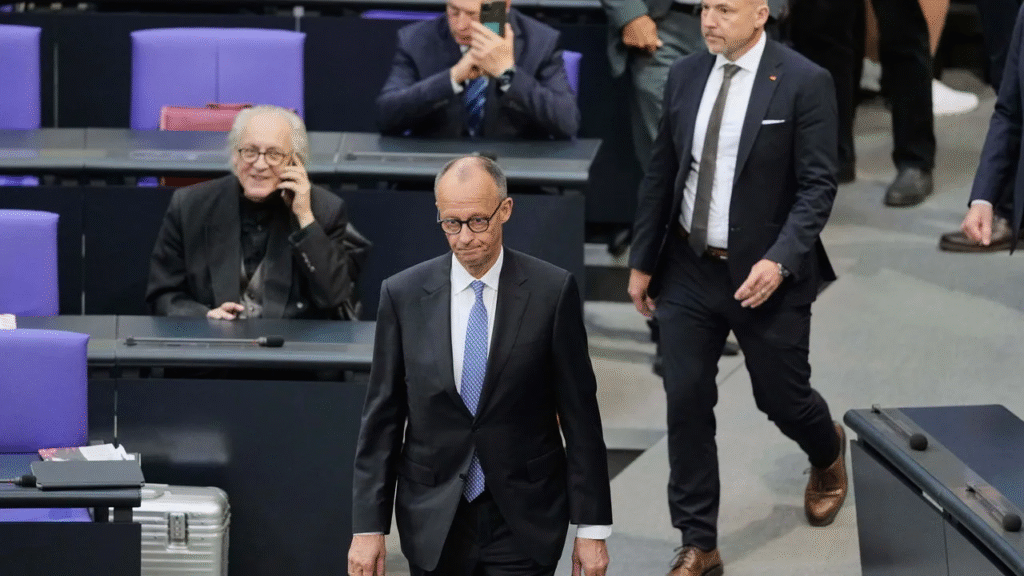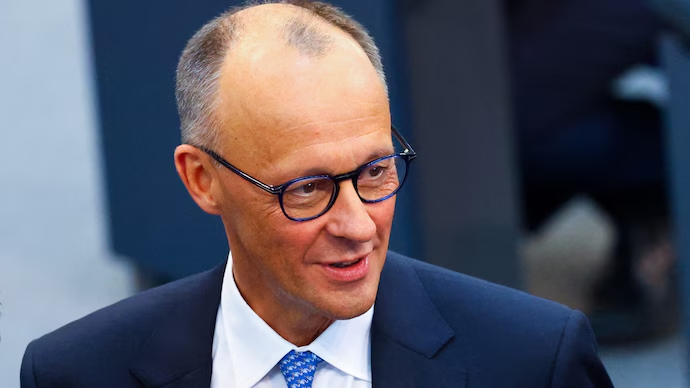
In an eventful and politically charged sequence of developments, Friedrich Merz, the longtime leader of Germany’s center-right Christian Democratic Union (CDU), emerged victorious as the new Chancellor of Germany—just hours after an unexpected defeat in the initial round of parliamentary voting. His dramatic ascension has rewritten recent political history in Berlin, surprising not only the Bundestag but also the world watching from afar. What began as a turbulent parliamentary session quickly turned into a moment of redemption, one that marks a pivotal turn in Germany’s post-Angela Merkel era.
This transition is not merely symbolic. It signals a reshaping of Germany’s political climate at a time when Europe faces unprecedented global pressures—from economic downturns and immigration challenges to energy insecurity and war at the EU’s borders. For Merz, the stakes could not be higher.
A Leader Rises From the Ashes of Political Defeat
Friedrich Merz is no stranger to political rivalry, resurrection, or responsibility. Having spent years away from the forefront of German politics after falling out with Angela Merkel’s centrist vision for the CDU, Merz clawed his way back into relevance through persistence, ideological clarity, and a loyal political base. His return was initially dismissed by many as nostalgic, a man out of step with modern Europe. But recent events have proven those critics wrong.
After guiding the CDU to a narrow but clear victory in Germany’s federal elections earlier this year, Merz positioned himself as the frontrunner for the chancellorship. It was expected to be a procedural formality. However, what followed was a sharp jolt to the CDU’s confidence. In the first round of voting held by the Bundestag, Merz failed to secure the absolute majority needed to assume office. The opposition Social Democrats (SPD), along with a few wavering coalition members, withheld their votes.
The political establishment gasped. Newsrooms across Germany lit up with commentary questioning the internal coherence of the CDU, as well as Merz’s ability to unite a divided parliament. But as quickly as the clouds gathered, they lifted. In the second round of voting—held under tense scrutiny—Merz pulled ahead decisively, securing 325 votes, narrowly crossing the threshold of 316 needed for confirmation. It was a razor-thin win, but a win nonetheless.
What Merz’s Election Means for Germany and Europe
With Merz now formally in office, the implications of his leadership are immense. Known for his economically conservative views and support for transatlantic relations, Merz represents a stark departure from the social and environmental priorities that defined Angela Merkel’s later years and the brief chancellorship of Olaf Scholz. Where Merkel embraced pragmatic centrism and coalition diplomacy, Merz leans toward fiscal discipline, law-and-order governance, and a renewed emphasis on national identity within a European framework.
For Europe, the shift could be felt in key policy areas. Merz is expected to advocate for stricter immigration controls, more robust NATO cooperation, and a tempered but clear stance on green energy transition—balancing environmental commitments with industrial competitiveness. For Germany’s EU partners, this means the continent’s most powerful economy might take a more assertive, possibly less accommodating, role in negotiations.
How the First-Round Defeat Became a Turning Point
To fully understand the gravity of Merz’s second-round victory, it’s essential to explore the political dynamics that caused the initial failure. The CDU, while the largest party in the Bundestag, did not command an outright majority. It had formed a tenuous coalition with smaller parties, but discontent brewed underneath the surface. The opposition SPD, still stinging from its own electoral loss, capitalized on that division.
Several centrist and moderate voices within the coalition hesitated, some citing concerns about Merz’s ability to bridge ideological divides. These were not hardline critics but members anxious about the CDU veering too sharply right. When the first vote was counted and Merz fell short, the possibility of a drawn-out coalition crisis loomed.
Yet Merz responded with remarkable political acumen. In the short hours between votes, he convened urgent meetings with coalition partners, offered compromise portfolios, and gave a rare impromptu address that appealed to unity and urgency. He emphasized not only the need for stability but the CDU’s readiness to govern with resolve. By the time the second vote commenced, the tide had turned.
The Legacy of a Comeback Politician
Born in 1955 in the North Rhine-Westphalia town of Brilon, Friedrich Merz’s rise to power is steeped in decades of political engagement. A trained lawyer and one-time Member of the European Parliament, he served in various roles within the Bundestag, including as CDU’s parliamentary leader in the early 2000s. His departure from frontline politics came as Merkel’s consensus-driven centrism gained popularity. But Merz remained a towering figure on the party’s conservative wing, advocating for market liberalization, internal security, and national values.
His return to leadership in 2021 was met with mixed feelings within the CDU. Some saw it as a rejuvenation of core party values; others feared it signaled a regression. But Merz proved adept at navigating post-Merkel disorientation, eventually earning the party’s trust to lead it through a volatile election season.
Now, he stands atop Germany’s highest office. But as every seasoned politician knows, winning office is only the beginning. The question remains: can Merz govern effectively?
Policy Priorities in a Fragmented Landscape
Germany’s new Chancellor has outlined a policy roadmap that centers around five core areas: economic revival, energy reform, immigration control, education modernization, and foreign policy reorientation.
Economically, Merz plans to revive stagnating growth through corporate tax cuts and investment in tech sectors. He believes Germany must become globally competitive again—not just in auto manufacturing but also in AI, green technology, and digital services. His fiscal conservatism suggests austerity in some areas, but he has hinted at targeted stimulus to drive innovation.
On energy, Merz walks a fine line. While committed to reducing carbon emissions, he has criticized the rapid decommissioning of nuclear and coal power, suggesting Germany needs a more “realistic” approach to energy security. This could lead to a partial reversal of energy policy, with renewed investment in hydrogen and synthetic fuels.
Immigration has long been a focal point for Merz. He supports skilled immigration and integration efforts but has called for more robust border controls and asylum vetting. His government is expected to push for a reform of EU-wide migration frameworks, potentially drawing both support and criticism from European allies.
Education is another area of focus. Merz has voiced concern over declining academic performance in German schools and universities. He wants to standardize curricula across federal states and increase investment in STEM programs, hoping to align Germany’s education system with future workforce demands.
Internationally, Merz reaffirms Germany’s commitment to NATO and transatlantic relations, particularly in light of ongoing Russian aggression in Ukraine. He has pledged continued military and humanitarian aid to Kyiv, echoing calls for European solidarity and defense readiness.
Public Reactions: Divided Yet Engaged
The German public remains divided on Merz’s victory. His base, largely rooted in conservative and rural regions, celebrated the win as a return to “principled leadership.” For them, Merz embodies discipline, national pride, and economic competence. Urban progressives and left-leaning voters, however, view his leadership with skepticism, fearing a rollback of social gains and climate policies.
Social media reactions ranged from jubilant support to sharp criticism. #KanzlerMerz trended on German Twitter (X), with memes, editorials, and think pieces flooding newsfeeds. Political commentators noted the generational divide, with younger voters less enthused than their older counterparts.
Still, there is cautious optimism in some corners. Many Germans are simply relieved that a coalition crisis was averted. The specter of prolonged instability—like the ones recently witnessed in other EU capitals—was real. Merz’s second-round success, while controversial, brought closure to a tense electoral cycle.
Global Reaction: Allies Congratulate, Adversaries Watch
World leaders were quick to respond to Merz’s election. U.S. President Joe Biden extended congratulations, emphasizing shared democratic values and commitment to Ukraine. French President Emmanuel Macron expressed confidence in continued Franco-German cooperation, especially on EU defense and energy policy.
From Moscow, the Kremlin offered a more muted response. Russian officials noted Merz’s hawkish stance on the Ukraine war but refrained from direct criticism. In Beijing, Chinese diplomats expressed hope for “mutually respectful” ties despite policy divergences.
India, Japan, and South Korea also sent diplomatic congratulations, citing hopes for stronger trade ties and cooperation in global governance.
What Lies Ahead: First 100 Days as the Crucible
The next three months will test Friedrich Merz like never before. From coalition management to legislative initiatives, every move will be scrutinized. Early reports suggest his cabinet will include both CDU loyalists and coalition partners, signaling an effort to maintain parliamentary stability.
Among the immediate tasks: passing an emergency economic stimulus bill, re-negotiating elements of Germany’s energy transition, and participating in the upcoming EU leadership summit where climate goals, Ukraine funding, and migration policies are on the agenda.
The tone Merz sets now could define his entire tenure. Will he govern from the center, tempering conservative instincts with pragmatism? Or will he push a harder ideological line, reshaping Germany in the image of a more robust, self-assured right?
A Final Word: Merz’s Moment Has Come
History will remember May 2025 as the moment Friedrich Merz, once sidelined and underestimated, reclaimed the political narrative and rose to Germany’s highest office. His journey reflects not only personal tenacity but also a broader shift in German politics—a desire for clarity, for discipline, for action amid the chaos of global change.
What Merz does with this moment will echo far beyond Berlin. For now, all eyes are on him, and the world watches as Germany steps into a new chapter—led by a man who refused to be counted out.

